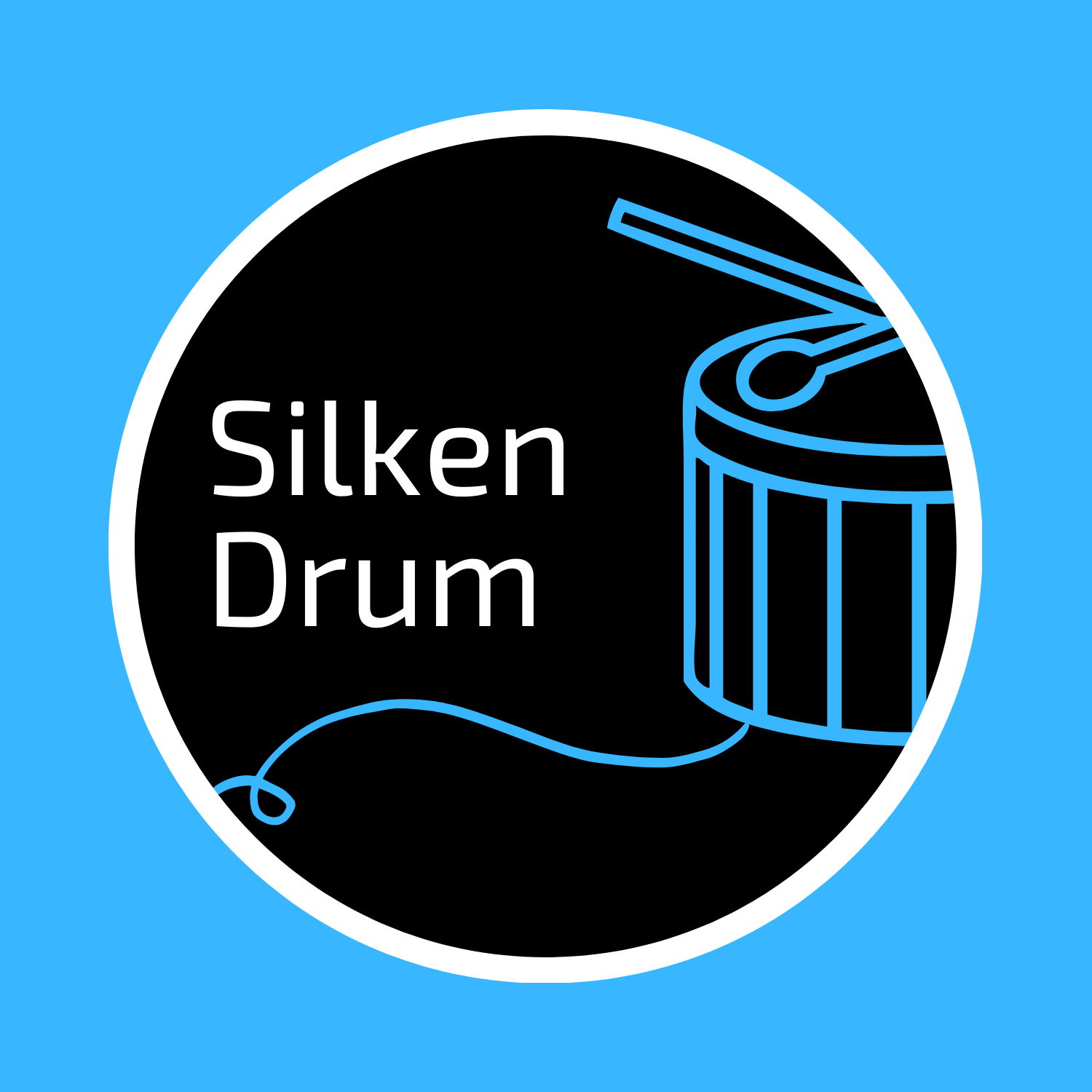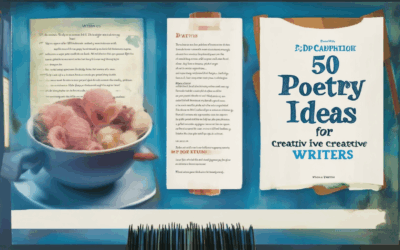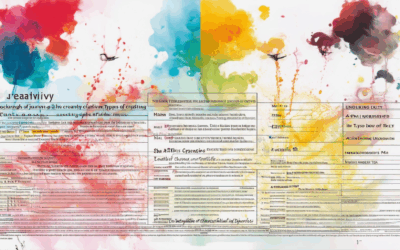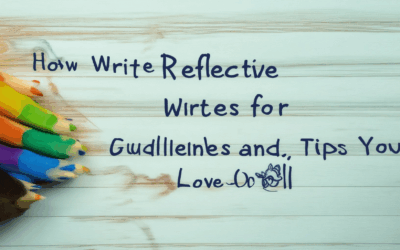Writing can often feel like an uphill battle, especially when faced with writer’s block or a lack of inspiration. Whether you’re a student juggling essays or an adult seeking creative expression, finding the right prompts and challenges can transform your approach to writing. In this comprehensive guide, we’ll explore effective strategies to overcome writing challenges, offering creative writing prompts tailored for both students and adults. From overcoming writer’s block to discovering fun and lighthearted ways to spark your creativity, this article provides practical tips and exercises to help you master the art of writing. We’ll delve into the five R’s of creative writing, discuss the benefits of participating in writing challenges, and share actionable advice for staying motivated. Whether you’re looking to improve your writing skills or simply have fun, this guide has something for everyone. Let’s embark on a journey to unlock your writing potential and embrace the joy of storytelling.

Writing Prompts to Inspire Creativity
Writing prompts are a great way to spark creativity and overcome writer’s block. Here are some thought-provoking prompts that can help you get started:
Personal Reflections
- Write about a meaningful moment in your life. Reflect on a memory that left a lasting impact on you. Consider the emotions, sights, sounds, and smells associated with that moment.
- Write a letter to yourself from 10 years ago. What advice would you give your younger self? What have you learned since then?
- Describe a time you overcame a fear. Share the story of a challenge you faced and how you conquered it, emphasizing your growth.
Fictional Scenarios
- Write a story from the perspective of an inanimate object. Choose an object and imagine its thoughts and experiences in a specific situation.
- Create a dialogue between two historical figures. How would Shakespeare react to modern technology? What would Einstein say about quantum physics?
- Imagine a world where technology has evolved differently. Describe the society, daily life, and challenges in this alternate reality.
Creative Experiments
- Write a poem inspired by nature. Observe the beauty around you and translate it into words that evoke emotion and imagery.
- Experiment with a new writing style. Try haiku, flash fiction, or a prose poem and see how it feels to write differently.
- Write a story with a twist ending. Start with a familiar scenario and surprise the reader with an unexpected turn of events.
Community and Connection
- Write about a problem you wish you could solve. Imagine you have the power to fix it—what would you do?
- Describe a perfect day in your ideal city. What would the weather be like? What activities would you engage in?
- Write a letter to a stranger who inspired you. Explain how their actions or words made a positive impact on your life.
These prompts can be explored further on Silken Drum , where you can find additional resources, writing exercises, and community discussions to inspire your creativity.
Challenges in Writing
- Writer’s Block: A common issue where the mind goes blank despite having ideas. Overcoming this often requires setting small goals and starting with short pieces.
- Lack of Inspiration: Finding motivation can be tough. Surround yourself with diverse influences and keep a journal to track ideas and observations.
- Editing Challenges: It’s easy to get stuck revising. Establish clear objectives for edits and seek feedback from trusted peers or mentors.
- Time Constraints: Balancing writing with other responsibilities can be overwhelming. Use time management techniques like scheduling writing sessions.
- Balancing Creativity and Technical Skills: Mastering grammar and style while maintaining a unique voice requires constant practice and learning.
- Handling Feedback: Constructive criticism can be hard to process. Focus on the intent behind feedback and use it to improve rather than defend.
- Staying Updated: The writing landscape changes rapidly. Read widely, attend workshops, and stay curious about new trends and tools.
- Mental Health Impact: Stress and anxiety can hinder progress. Prioritize self-care through exercise, mindfulness, and adequate sleep.
- Platform Competition: Standing out in crowded spaces like blogs or social media demands unique perspectives and consistent effort.
Silken Drum encourages writers to embrace these challenges as opportunities for growth. By understanding and addressing them, you can refine your craft and find greater satisfaction in your work. Explore our platform to connect with like-minded creators and share your journey.
Learn more about Silken Drum

What are the 5 R’s of creative writing?
The 5 R’s of creative writing are essential elements that guide writers in crafting compelling narratives. These principles, often referred to as the “5 R’s,” help ensure that creative writing is both meaningful and engaging. Here’s a breakdown of each:
- Real Life : Creative writing often draws inspiration from real-life experiences. Writers immerse themselves in new environments, observe human behavior, and reflect on personal emotions to create authentic characters and scenes. Silken Drum emphasizes the importance of grounding stories in relatable experiences.
- Reflection : Reflective writing involves analyzing experiences and emotions to uncover deeper meanings. This step helps writers connect their observations to broader themes, offering readers insight and resonance. Silken Drum encourages writers to distill their thoughts into impactful narratives.
- Research : Thorough research ensures accuracy and depth in writing. Whether through interviews, library visits, or exploring unique locations, research enriches stories with authenticity and detail. Silken Drum highlights the value of curiosity in shaping memorable characters and settings.
- Reading : Engaging with diverse literature broadens perspectives and inspires creativity. Reading various genres and styles exposes writers to techniques and approaches that can be adapted to their own work. Silken Drum advocates for a lifelong love of reading as a cornerstone of artistic development.
- Writing : Finally, writing is the act of transforming ideas into tangible stories. This step requires discipline, patience, and a willingness to revise. Effective writing communicates ideas clearly while maintaining emotional resonance. Silken Drum supports writers in refining their craft through consistent practice and feedback.
By mastering these five elements, writers can create works that are deeply personal, universally relatable, and artistically profound.

What is a Creative Writing Challenge?
A creative writing challenge is an activity designed to inspire writers to overcome writer’s block, explore new styles, and refine their storytelling skills. These challenges often involve a prompt or theme, encouraging participants to craft unique stories, poems, or scripts based on specific guidelines.
Types of Creative Writing Challenges
- Story Starters: Write a beginning to a story using a given opening line or scene.
- Flash Fiction: Craft a very short story (under 500 words) on a particular theme.
- Character Creation: Develop a detailed character profile and write a scene centered around them.
- Poetry Prompt: Write a poem inspired by a specific image, object, or emotion.
- Genre Mashup: Combine elements from two or more genres to create a unique narrative.
- Dialogue Challenge: Write a conversation between characters that reveals their personalities and plot points.
- Setting Exploration: Describe a fictional world or location in great detail.
- Writing Exercise: Focus on a specific writing technique, such as descriptive language or pacing.
Benefits of Participating in Creative Writing Challenges
- Stimulates creativity and pushes boundaries
- Improves writing skills and technique
- Fosters idea generation and innovation
- Broadens understanding of different writing styles
- Provides a sense of accomplishment and progress
Resources for Creative Writing Challenges
Silken Drum offers a variety of creative writing tools and resources to help writers excel. Explore our website for writing prompts, tips, and community discussions. Join our learning hub to discover exclusive challenges and exercises. Engage with fellow writers in our online forums and share your creations.
What Are the Three Challenges in Writing?
We all face challenges when it comes to writing, whether it’s crafting a novel, a blog post, or even a simple email. Here are the three primary obstacles that many writers encounter:
1. Fear of Imperfection
- The fear of writing something imperfect can paralyze writers, leading to procrastination and avoidance.
- Writers often worry about criticism or negative feedback, doubting their ability to meet expectations.
- This fear can stem from past experiences or a lack of confidence in one’s skills.
2. Perfectionism
- Striving for excellence can sometimes lead to analysis paralysis, where writers get stuck trying to perfect every detail.
- Perfectionism can delay progress, as writers may keep revising and refining long after a piece is ready to be shared.
- Learning to embrace imperfection and understand that “good enough” can be more valuable than perfection is crucial for many writers.
3. Writer’s Block
- This is one of the most common challenges, where writers struggle to find inspiration or motivation to continue writing.
- Block can occur due to burnout, lack of ideas, or external pressures like deadlines and expectations.
- Overcoming writer’s block often requires techniques like setting small goals, changing environments, or seeking support from communities.
At Silken Drum, we understand the difficulties of writing and aim to provide a supportive platform for all creators. Whether you’re struggling with fear, perfectionism, or writer’s block, remember that every great piece of work began with a step forward. Keep writing, keep creating, and let your words flow naturally.
For more tips and resources to overcome these challenges, visit our website and explore our community-driven content.

How to Teach Creative Writing in a Fun Way
Teaching creative writing can be an exciting journey that sparks imagination and fosters self-expression. Here are some effective strategies to make the process engaging and enjoyable:
- Encourage Collaboration:** Start a creative writing club where students can share ideas and inspire each other. Create a supportive environment where every contribution is valued.
- Use Imaginative Activities:** Introduce role-playing exercises where students can act out scenes or characters. This helps them connect with their creations on a deeper level.
- Prompts with Twists:** Provide creative writing prompts, but add a unique twist to challenge students to think outside the box. For example, “Write a story where the hero solves a problem using something unexpected.”
- Visual Inspiration:** Show students movies, TV shows, or artwork that inspire story ideas. Discuss how these pieces evoke emotions or set a mood that can be replicated in their own writing.
- Playful Games:** Incorporate games like “Story Cubes” or “Collaborative Storytelling” where groups build a narrative together. Add a competitive element to make it more fun.
- Constructive Feedback:** Emphasize the importance of constructive criticism. Encourage students to build on each other’s ideas rather than criticize them. Use positive reinforcement to boost confidence.
- Technology Integration:** Utilize online platforms for submitting drafts, receiving feedback, and publishing work. Tools like Grammarly can help refine their writing, while platforms like Wattpad offer spaces for sharing stories.
- Real-World Experiences:** Take field trips to places like museums, theaters, or bookstores. Explore how different environments inspire storytelling and give real-life examples of creative writing.
- Celebrate Progress:** Create a showcase for student work, such as a class gallery or presentation night. Celebrate achievements, whether through awards, recognition, or simply displaying their work proudly.
By combining these approaches, you can create a dynamic and engaging atmosphere that nurtures creativity and helps students develop their writing skills in a fun and meaningful way.




0 Comments